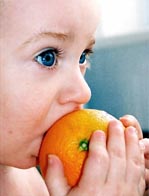Children get taste for meat and fish from parents, study shows
Children inherit their taste for meat and fish but when it comes to vegetables and desserts it's more nurture than nature, according to a study on Wednesday.

Scientists who compared the food preferences of identical and fraternal twins found that some tastes are inherited while others are acquired.
"This is the first study to include significant numbers of protein foods and the first to show a high heritability for these," said Professor Jane Wardle of the charity Cancer Research UK.
Mothers of 103 pairs of four and five-year-old identical twins and 111 pairs of non-identical twins were given lists of 77 foods in different categories and told to rate how much their children liked them.
Identical twins share all the same genes while fraternal twins share only half, so comparing their food preferences highlights which tastes are inherited and which are influenced by environmental factors.
The scientists determined the heritability by looking at how similar the identical and fraternal twins' liking for foods were, reports Reuters.
According to Life Style Extra, youngsters inherit their tastes for meat from parents - but when it comes to greens genes have little to do with it, a survey claims.
The report, carried by Cancer Research UK scientists, discovered that a liking for high protein dishes such as beef, lamb, fish and chicken was hereditary. By contrast, a dislike of vegetables and puddings was more likely to be subjective and the result of external environmental factors.
But girls are more likely to like vegetables than boys, it was stated.
Professor Jane Wardle, of Cancer Research UK’s health behaviour unit, who led the study, said: "Finding out more about why children like and dislike foods is important in helping us understand the problems of obesity. Childhood obesity can lead to a number of health problems in later life including cancer.
"This is the first study to include significant numbers of protein foods and the first to show high heritability for these. But it is not clear exactly what environmental factors are influential when it comes to fruit, vegetables or puddings.
"It might be that children who witness their parents show enthusiasm or distaste for certain types of vegetables or puddings are likely to follow suit. Or it might be that if a particular food is always available children learn to like it. For instance if a fruit bowl is always full of bananas children might think of them as being a favourite food."
O.Ch.
Subscribe to Pravda.Ru Telegram channel, Facebook, RSS!

